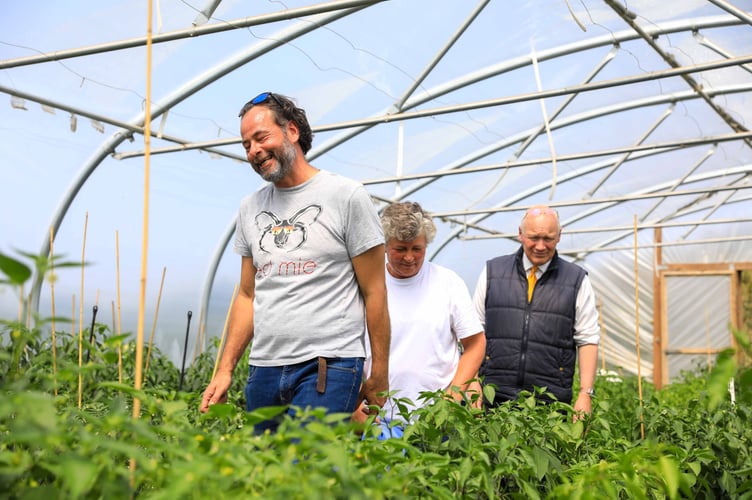When your business is proving hot stuff, it’s important to keep that entrepreneurial fire burning.
Stuart and Ruth Meade started growing chillies on their Red Mie smallholding in Ballaugh in 2021.
Since then, interest in that side of their business has been heating up so much, they’re launching their range of hot sauces under new branding as ‘Fire Island’.
The concept aims to blend the culinary heat of the island’s first chilli farm with a dash of the full-throttle thrills of the TT, and showcase the Manx spirit to wider markets.
‘The chillies are grown in a very responsible, neutral way, on a biosphere island that happens to be the home of one of the most exciting motorsport road races in the world,’ said Stu.
‘We’re hoping all that helps the product stand out from competitors on the shelves.
‘We want the sauces and logo to look different, to look like nothing else on the shelf. We’re hoping it all knits together, a product that also works away from the island.’
As well as chillies, Red Mie produces loaghtans, eggs and point-of-lay poultry, and hosts courses in poultry keeping and chilli growing, as well as educational visits and farm experience sessions.
With the interest in chillies, along with the inventive range of hot sauces, making them a signature product, Ruth said it made sense to bring that aspect of the business under its own branding.
‘Also Red Mie – Manx for “Good Things” – doesn’t mean too much to visitors from off-island, so to give our chilli products broader appeal we decided that the name Fire Island would work really well.”
The couple have plenty of plans for the year ahead, and so have doubled up on their chilli crop.
‘We only use our own chillies, we never buy them in, so we have got twice as many this year, allowing us the capacity to make more stock,’ said Ruth.
Last year their polytunnel was home to 22 varieties of chilli and 260 plants. For this year’s harvest, they planted 45 varieties and 500 plants. Each plant should provide around one kilo of chillies.
The aim is to be able to make enough sauces to enter the Great Taste Awards in January, and be able to launch into the UK market.
‘It’s about having flavour, not just the heat,’ she said. ‘The levels of flavour in our sauces are so important. It’s getting out the message that hot sauce isn’t just about blowing your head off.’
They are also working on a special chilli ketchup for next year’s motorcycle action, working with the organisers to produce a Taste of the TT Races ketchup. Which seems fitting, as it was the races that brought them together in the first place.
‘We met just over six years ago when Stuart came to visit the Isle of Man for the TT,’ said Ruth.
‘We were friends of friends and as it was a very wet TT, much time was spent in the pub socialising. By the end the week we knew that we wanted to see more of each other. Stuart moved over later that year and quickly decided that he was keen to be fully involved with the farming side of life.’
It was Stuart’s enthusiasm for chillies that led him to spot a gap in the local market.
‘I love cooking with chillies and, when I came here, I wanted to make a goat curry with some meat from the Isle of Man Goat Farm.
‘So I went to try and get some scotch bonnet chillies and I couldn’t get any, anywhere at all, which I found a bit odd, so it all sprang out of that.’
Like the chillies themselves, interest in the different varieties the couple produce has continued to grow, which Stuart feels is partly down to people experiencing different foods and becoming more adventurous when cooking.
‘Chillies are immensely versatile. Some people have this opinion that you just throw them into a curry or chilli and it will make them hot. But there’s so much more to it,’ he said.
‘There’s a lot of variety, a lot of flavours. We’re growing some that you literally can’t buy anywhere else. We have got chillies that taste of kiwi fruit, that taste of peach, as well as having the heat behind the flavour.
‘Chillies are fun and interesting to grow.’
Nonetheless, there’s no room for a slapdash approach when tending to them.
‘You have to be mindful. With your superhots, [such as Carolina Reaper, ghost pepper and naga chilli, all at the volcanic end of the Scoville scale which measures the spiciness of peppers] when they ripen they can seep a little.
‘If you rub your eyes or, god forbid, go to the toilet, then that will have… repercussions,”’he said, with admirable understatement. ‘I do have a lot of respect for the superhots.’
The sauces began as an unplanned extra, when Stuart and Ruth were invited to have a stall at the island’s Food & Drink Festival before the chilli farm was fully operational.
‘Using chillies and making my own sauces was something I always wanted to do,’ said Stuart.
‘But we only did the first batch as a way to advertise the chilli farm in advance when we were at the Food and Drink Festival.
‘I didn’t want to be standing behind an empty table just telling people about what the chilli farm would be doing. So I thought I’d make some hot sauce and hot honey, then we’ve got something to offer as samples on the table.
‘We sold out all the stock we had in a few hours on the first day,’ he said. ‘And we thought “maybe this is an opportunity, instead of just a bit of marketing”. And it went from there.’
The range now includes the original hot sauce – made with scotch bonnet peppers, roasted sweet pepper, garlic and shallots – a Scorpion hot sauce, a lemon and herb hot sauce that goes well with seafood, hot honey, and a cranberry, burnt orange and chilli sauce which provides a mild heat for salmon or roast meats, and is great on cheeseboards.
There are plenty of ideas for other varieties, but they feel it’s important to concentrate on the core range for now and offer some limited edition seasonal extras, like the potentially frightening sauce that appears in October for Hop-tu-Naa – the Hot-Tu-Naa Hot Sauce – that uses Ghost peppers and the fearsome Carolina Reaper, a chilli described as having a ‘sweet and fruity flavour with unrelenting, face-melting heat’.
Having said that, the cranberry, burnt orange and chilli sauce was only meant to be a Christmas product, but has proved so popular it’s part of the main range now.
‘It’s great on a cheese board all year round, but also goes so well with a meal of roast loaghtan,’ said Ruth.
They enjoy interaction with their customers, and have been meeting plenty of new ones as the chillies have taken off.
They’ve been part of the outdoor Douglas Foodies Market since it opened last month. Part of the value of the market, Stuart feels, is the different type of shopping experience it offers.
‘You get a story behind each product, all local from around the island. And customers can ask questions, like how to cook with that food, or what to use with it.’
And the face-to-face engagement has inspired him to experiment with a potential new line, after a visitor said he was allergic to apples and so couldn’t try the hot sauces – they contain apple cider vinegar to help control the consistency and stability of the sauce. Stuart said he now plans to try rice wine or red wine vinegars as an alternative.
The production of the chillies incorporates other elements of their farm. When the chillies are out of the ground, the 56ft x 24ft polytunnel is somewhere the chickens can roam in and out of during winter. Manure from the loaghtans forms part of the chillies’ bedding, with wool used as mulch on the plants.
This autumn, they plan to set up the polytunnel with grow lights and heat mats, which tend to be low-wattage, and run them with solar and wind power.
There’s a lot of excitement about how well the chillies have been received, and various ideas in the offing for the future, including the possibility of another polytunnel, depending on planning permission.
‘We want to expand, because the interest in the chillies is out there,’ said Stuart.




